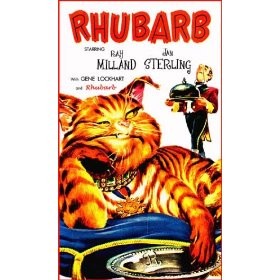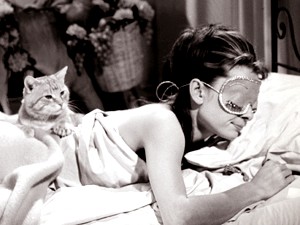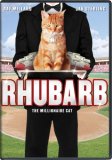| Reviews & Columns |
|
Reviews DVD TV on DVD Blu-ray 4K UHD International DVDs In Theaters Reviews by Studio Video Games Features Collector Series DVDs Easter Egg Database Interviews DVD Talk Radio Feature Articles Columns Anime Talk DVD Savant Horror DVDs The M.O.D. Squad Art House HD Talk Silent DVD
|
DVD Talk Forum |
|
|
| Resources |
|
DVD Price Search Customer Service #'s RCE Info Links |
|
Columns
|
|
|
Rhubarb
Ugly ad art for Rhubarb (L)... and Orangey the Cat in a somewhat better-remembered role (R)
Eccentric millionaire Thaddeus J. Banner (Gene Lockhart) adopts a feral cat caught stealing golf balls from the fairways of his country club. Others hate the cat for disrupting their games, but Banner admires its spirit: "I like things that fight back," he says, "Like artichokes!" Banner, a widower, tames the cat, names it Rhubarb and the two become inseparable. Several years later, when Banner dies, he surprises his business associates and only daughter, spoiled Myra (Elsie Holmes), by leaving nearly his entire estate - some $30 million - to Rhubarb. Eric Yeager (Ray Milland), press agent for Banner's lowly baseball team, is named the pussycat's guardian.
At first, the team doesn't take to their new owner, especially when the other ballclubs and taunting fans begin teasing them about having a cat for a boss. But Yeager tricks the team into thinking Rhubarb will bring them luck, and lo and behold not only do they start enjoying Rhubarb's company, they begin winning games and become contenders in the pennant race. Meanwhile, Yeager's romance with Polly (Jan Sterling), the daughter of team manager Len Sickles (William Frawley, in his last film before playing Fred Mertz on I Love Lucy) is threatened when she develops an allergy with the cat Yeager must baby-sit 24-7.
Produced by George Seaton (Miracle on 34th Street) and William Perlberg (It Happens Every Spring) and directed by Arthur Lubin (the Francis the Talking Mule series), Rhuburb is predictable but harmless, mild but enjoyable. It's strange watching erudite Brit Ray Milland playing a Runyonesque character like Yeager ("For da love of Mike, doll!" he says), but then again Milland frequently played New Englander-type Americans, so why not? The Runyonesque elements are most obvious in the character names: Orlando Dill, Ogelthorpe Meadows, Mona Lizzie, Cadaver Jones, Pencil Louie, etc. Not surprisingly, gangsters invade the story near the end.
The film's greatest asset, something the filmmakers may not have realized since it's so underemphasized, is its heart. Lockhart positively adores Rhubarb, and this eccentric old man's love of an initially unlovable stray is genuinely sweet. (Producer Seaton here reunites Lockhart with Frawley, who played the judge and his campaign manager, respectively, in Miracle on 34th Street.)
Later, in the scene where Yeager tricks the dumb and superstitious ballplayers (including a 20-year-old Leonard Nimoy) into thinking petting Rhubarb will bring them luck, the key actor in the scene is an uncredited Strother Martin (Cool Hand Luke). He's hilarious, tentatively approaching the notoriously vicious pussycat, delighted when the cat lets him pet it, then ecstatic when it seems to bring him good luck. This is one of those films crammed with great character types: look for Willard Waterman, James Griffith, Donald MacBride, Madge Blake, Tristram Coffin, Sandra Gould, Donald Kerr, and many others. Sterling's husband Paul Douglas has a funny cameo appearance at the end.
Though Rhubarb is largely forgotten, Rhubarb the cat was a busy Hollywood performer, and chances are you've seen him in other things. Billed both as Rhubarb and under his real name, Orangey, the red tabby was a regular on the popular sitcom Our Miss Brooks (as "Minerva"), while sci-fi and horror film fans remember him as Neutron in This Island Earth (1955), as Cleopatra in The Comedy of Terrors (1962), and as the housecat that turns on his owner in a BIG way in The Incredible Shrinking Man (1957). (He was even prominently featured on that film's poster.) Orangey must have lived to a ripe old age, because he got to play another monster menace in Bert I. Gordon's Village of Giants (1965). But Orangey's shining moment came starring opposite Audrey Hepburn in Breakfast at Tiffany's (1961) for which he won an unprecedented second Patsy Award, the animal world's equivalent of the Oscar.
One interesting side-note about the picture, at least for those interested in the film industry's love-hate relationship with television during those early days. When Polly and others watch baseball games on TV, there's an attempt to spoof both the endless commercial interruptions and, more significantly, the poor picture quality of early live video transmissions. As was standard practice, the image Polly sees on her TV screen has been optically matted in, but the footage has amusingly been heavily distorted to a very good approximation of early videography, right down to how the oldest TV cameras had lenses mounted on turrets which meant the picture would drop out momentarily when the lenses were shifted around. Though Hollywood movies of this period frequently made fun of TV's shortcomings, I've never seen a depiction quite like this.
Video & Audio
Rhubarb is presented in its original full frame format in a fairly good black and white transfer. The image is sharp with little signs of wear, and the blacks are strong throughout. The mono audio is okay, nothing special. There are no subtitle or alternate audio options and no Extra Features.
Parting Thoughts
Rhubarb isn't going to top any DVD bestseller lists but it's pleasant with something to offer classic film buffs and families looking for some innocent entertainment. No great shakes, but it's Recommended.
Film historian Stuart Galbraith IV's latest book, The Toho Studios Story, is on sale now.
|
| Popular Reviews |
| Sponsored Links |
|
|
| Sponsored Links |
|
|
| Release List | Reviews | Shop | Newsletter | Forum | DVD Giveaways | Blu-Ray | Advertise |
|
Copyright 2024 DVDTalk.com All Rights Reserved. Legal Info, Privacy Policy, Terms of Use,
Manage Preferences,
Your Privacy Choices | |||||||















